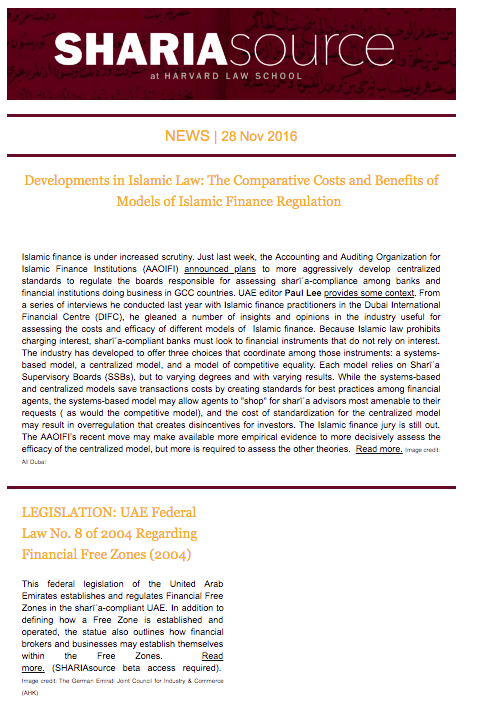
 Developments in Islamic Law: The Comparative Costs and Benefits of Models of Islamic Finance Regulation Islamic finance is under increased scrutiny. Just last week, the Accounting and Auditing Organization for Islamic Finance Institutions (AAOIFI) announced plans to more aggressively develop centralized standards to regulate the boards responsible for assessing sharīʿa-compliance among banks and financial institutions doing business in GCC countries. UAE editor Paul Lee provides some context. From a series of interviews he conducted last year with Islamic finance practitioners in the Dubai International Financial Centre (DIFC), he gleaned a number of insights and opinions in the industry useful for assessing the costs and efficacy of different models of Islamic finance. Because Islamic law prohibits charging interest, sharīʿa-compliant banks must look to financial instruments that do not rely on interest. The industry has developed to offer three choices that coordinate among those instruments: a systems-based model, a centralized model, and a model of competitive equality. Each model relies on Sharīʿa Supervisory Boards (SSBs), but to varying degrees and with varying results. While the systems-based and centralized models save transactions costs by creating standards for best practices among financial agents, the systems-based model may allow agents to “shop” for sharīʿa advisors most amenable to their requests ( as would the competitive model), and the cost of standardization for the centralized model may result in overregulation that creates disincentives for investors. The Islamic finance jury is still out. The AAOIFI’s recent move may make available more empirical evidence to more decisively assess the efficacy of the centralized model, but more is required to assess the other theories. Read more. Image Credit: SHARIAsource
Developments in Islamic Law: The Comparative Costs and Benefits of Models of Islamic Finance Regulation Islamic finance is under increased scrutiny. Just last week, the Accounting and Auditing Organization for Islamic Finance Institutions (AAOIFI) announced plans to more aggressively develop centralized standards to regulate the boards responsible for assessing sharīʿa-compliance among banks and financial institutions doing business in GCC countries. UAE editor Paul Lee provides some context. From a series of interviews he conducted last year with Islamic finance practitioners in the Dubai International Financial Centre (DIFC), he gleaned a number of insights and opinions in the industry useful for assessing the costs and efficacy of different models of Islamic finance. Because Islamic law prohibits charging interest, sharīʿa-compliant banks must look to financial instruments that do not rely on interest. The industry has developed to offer three choices that coordinate among those instruments: a systems-based model, a centralized model, and a model of competitive equality. Each model relies on Sharīʿa Supervisory Boards (SSBs), but to varying degrees and with varying results. While the systems-based and centralized models save transactions costs by creating standards for best practices among financial agents, the systems-based model may allow agents to “shop” for sharīʿa advisors most amenable to their requests ( as would the competitive model), and the cost of standardization for the centralized model may result in overregulation that creates disincentives for investors. The Islamic finance jury is still out. The AAOIFI’s recent move may make available more empirical evidence to more decisively assess the efficacy of the centralized model, but more is required to assess the other theories. Read more. Image Credit: SHARIAsource
 LEGISLATION: UAE Federal Law No. 8 of 2004 Regarding Financial Free Zones (2004) This federal legislation of the United Arab Emirates establishes and regulates Financial Free Zones in the sharīʿa-compliant UAE. In addition to defining how a Free Zone is established and operated, the statue also outlines how financial brokers and businesses may establish themselves within the Free Zones. Read more. Image Credit: SHARIAsource
LEGISLATION: UAE Federal Law No. 8 of 2004 Regarding Financial Free Zones (2004) This federal legislation of the United Arab Emirates establishes and regulates Financial Free Zones in the sharīʿa-compliant UAE. In addition to defining how a Free Zone is established and operated, the statue also outlines how financial brokers and businesses may establish themselves within the Free Zones. Read more. Image Credit: SHARIAsource
 Professor Intisar Rabb Joins Emerson College’s Engagement Lab Intisar Rabb, Professor of Harvard Law School and SHARIAsource founding editor-in-chief, has joined the Advisory Board of Emerson College’sEngagement Lab. Described as “an applied research lab for reimagining civic engagement in a digital culture,” this unique organization’s vision shares many commonalities with that of SHARIAsource. With twenty-six national partners and over a dozen projects incubating, the Lab focuses on using new media and data to increase media literacy and community engagement. Image Credit: SHARIAsource
Professor Intisar Rabb Joins Emerson College’s Engagement Lab Intisar Rabb, Professor of Harvard Law School and SHARIAsource founding editor-in-chief, has joined the Advisory Board of Emerson College’sEngagement Lab. Described as “an applied research lab for reimagining civic engagement in a digital culture,” this unique organization’s vision shares many commonalities with that of SHARIAsource. With twenty-six national partners and over a dozen projects incubating, the Lab focuses on using new media and data to increase media literacy and community engagement. Image Credit: SHARIAsource
See the full newsletter.

